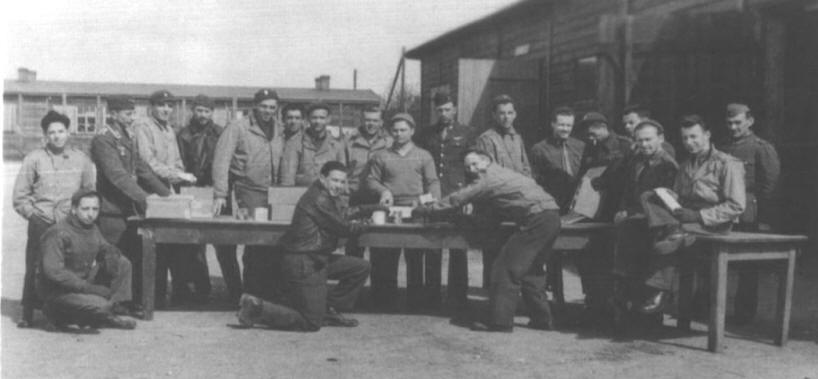|
Honor Bound
by Jack Moskowitz
In
September 1943, as a newly commissioned 2nd Lt. Navigator, I
was assigned to the 452nd Bomb Group at Moses Lake Washington.
This was a new group being formed for service in the 8th Air
Force, and I was attached to a crew headed by Lt. Theodore MacDonald.
"I’ll
call you Murph,” MacDonald said when we met.
“OK”, I replied, “I’ll
call you Mac.” We had
quite a lot in common and quickly established a rapport.
He was from Rochester, New York, and I was from Brooklyn.
Both of us had lost our mothers at an early age and had left
college to enlist in the Air Corps.
During our three-month training period, our friendship grew. With the New
Year in 1944, our group was sent to England and we began flying bombing
missions against Germany. Losses
were heavy at that time. Our
commanding Officer was shot down on the group’s first mission.
On our crew’s eighth mission, a daylight raid on Berlin, we were in the
lead squadron and were attacked over Hanover by German “Focke Wulfe”
fighter planes. Our bomber
was struck repeatedly from nose to tail.
Two engines were knocked out of commission.
I was in the nose of the plane and was hit several times in my
right leg. My parachute was
shredded by the cannon fire. MacDonald
was ringing the “Bail Out” bell, ordering us to evacuate the plane.
I yelled to him over the intercom, “Mac, I have no chute!”
“Come up here and take mine!” he said without hesitation.
“Get out now!”
He was my superior and I did as I was instructed.
I took the chute, went to the hatch, and after the bombardier and
copilot had evacuated the plane, I too jumped.
Fortunately for me, after scraping through trees, I landed in the midst of
a Luftwaffe anti-aircraft battery. I
was immediately taken prisoner and placed in a small cell at an air base.
Miserable hours went by, as I sat alone in the dark, pondering the
fate of MacDonald who I’d left in the disabled airplane.
I knew the man had saved my life, and possibly sacrificed his own
in the process. I just hoped
and prayed he had made it, and I resolved to do everything I could do to
discover what had happened to him.
After what seemed like forever, I heard footsteps approaching my cell.
The door opened and two German guards appeared.
Standing between them was none other than Lieutenant Ted MacDonald,
looking a little the worse for wear, but otherwise unharmed.
We grinned at each other and I breathed a long sigh of relief.
When the guards left, Mac told me he had managed to crash-land the
plane but hadn’t got far before being captured.
Soon we were sent to Stalag Luft I prison camp for air corps personnel.
My wounded leg festered and swelled and I became feverish.
MacDonald, noticing this called Colonel Hancke, the camp doctor,
who was a British officer. He
had me transferred to the POW hospital for treatment.
I was there for a month.
Liberated by our allies at
the war’s end, Ted and I both returned to civilian life.
Over the years we maintained our friendship.
Our sons went to college near Rochester, and two of his daughters
came to New York City. We
celebrated weddings and Bar Mitzvahs jointly.
In early 1992, disturbed at not having received our customary Christmas
card, I called Rochester and spoke to Ted’s wife, Patricia.
She told me that Ted was suffering from terminal cancer and
didn’t have too long to live. In
March my wife Irene and I flew to Rochester to see them.
Ted was fading rapidly.
There was a question that I felt I had to ask him.
It had haunted me for all these years, though strangely, I had
never mentioned it before, not even in the POW camp.
At his bedside, in a moment when I was alone with him, I finally
asked, “Mac, why did you give me your parachute?”
Despite his illness and weakness he replied in a firm voice,
“I was your commander – that’s what I had to do.”
I just nodded and gripped his hand.
I think I’d already known what his answer would be.
The reply was so typical of him.
Faithful to his country. Faithful
to his comrades.
Two days later, Patricia called to tell us Ted had passed away.
“He had held on for so long.
It was as if he was just waiting to see you first,” Patricia told
me.
That didn’t surprise me
either. The bond of
friendship tempered by the fire of combat is one of the strongest ties men
can have. Mac and I had that
connection. And always will.

The picture above is of the North I kitchen crew. Jack is the one kneeling in the lower left hand corner of the
photo. His friend Ted MacDonald is the 7th from the left . Sid Wohlman the adjutant to the senior allied officer is second from the
right.
|
